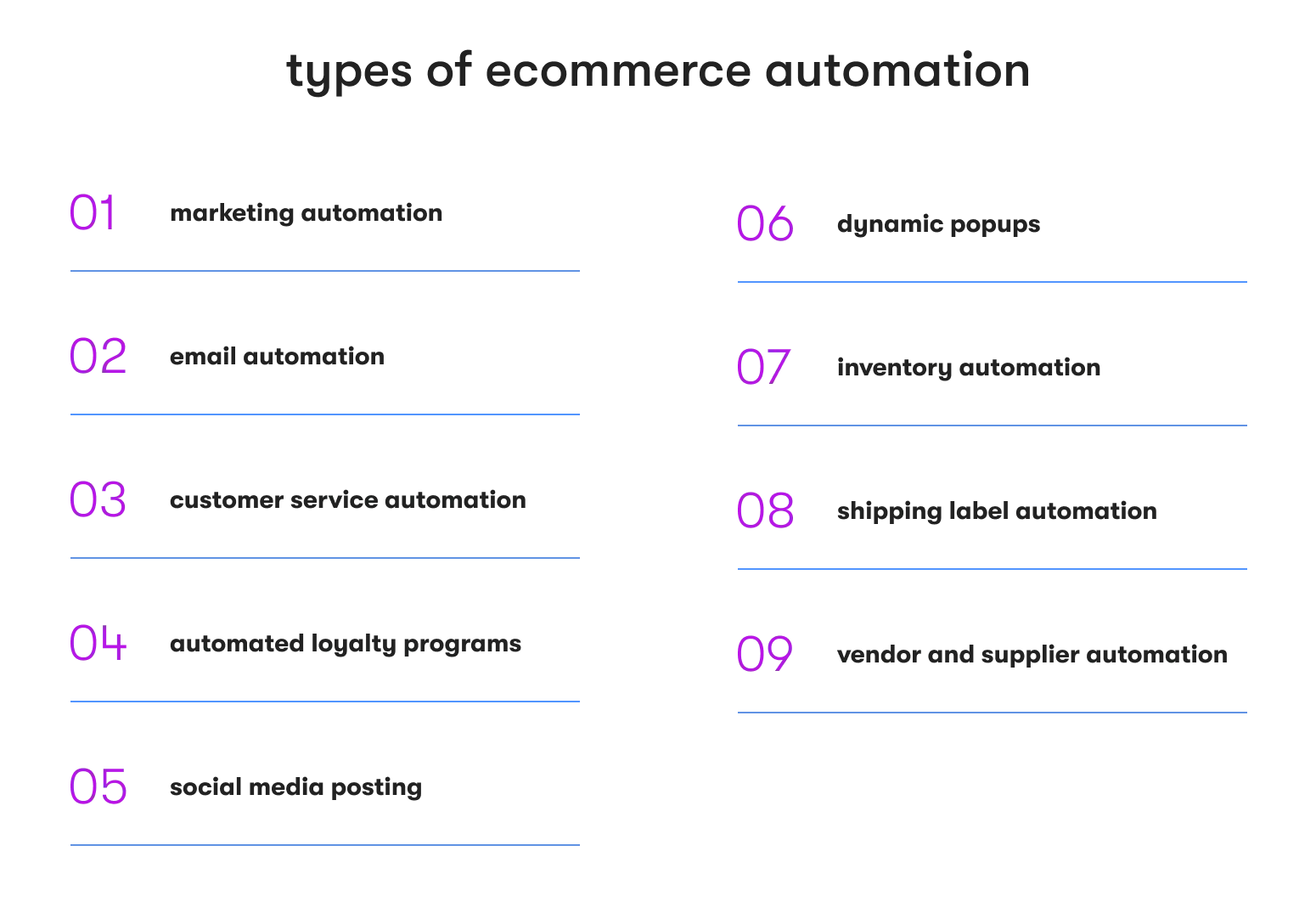In the highly competitive sphere of ecommerce, automation has become increasingly crucial. Ecommerce automation involves streamlining, automating, and optimizing repetitive and mundane tasks, increasing efficiency and freeing your time and resources. Whether email marketing automation, customer relationship management, or ecommerce processes like order tracking and inventory management, automation significantly impacts your ecommerce business' efficiency and profitability.
This technique enables you to simplify processes and provide a seamless customer experience, fostering customer loyalty. Simpler processes mean your operations run more smoothly, leading to better customer experience and increased sales. Therefore, this in-depth guide is for you if you've been asking, "What is ecommerce automation?" and "How to automate your ecommerce business?"
What is ecommerce automation?
Ecommerce automation implies the use of ecommerce automation software and tools to carry out routine and repetitive tasks within an ecommerce business's framework. It is a way to simplify processes, removing the strain of mundane tasks from your team so they can concentrate on driving strategic growth for your online store. It's also an automated ecommerce system devised to streamline ecommerce processes and support businesses, ensuring they stay competitive in the rapidly evolving digital market.
Ecommerce automation can be as simple as sending automated responses to customer inquiries or as sophisticated as retaining automated inventory tracking to prevent issues such as overselling. Moreover, automating repetitive tasks is more than just saving time. It also helps mitigate human errors, thereby increasing overall efficiency.
These automation ecommerce measures come into play at various stages of the ecommerce business, from maintaining high-volume sales at your ecommerce store to managing automated email marketing campaigns for customer retention and nurturing new leads. Automation can also be deployed to monitor customer interactions, gather crucial customer feedback, and keep track of vital data that aids in decision-making for marketing strategies.
The extent and scope of automation in ecommerce extend beyond just an automated ecommerce store itself. You have automated systems and workflows that govern elements like ecommerce order automation, ensuring the order processing and tracking are synchronized and accurate across multiple platforms. Consequently, ecommerce businesses can offer elevated customer experience and nurture customer loyalty — crucial factors driving long-term success.
OPTIMIZE YOUR BUSINESS WITH ECOMMERCE AUTOMATION
We integrate automated workflow setups so you can focus on growing your ecommerce business.
Benefits of using automation in ecommerce
In today's fast-paced world of ecommerce, customization, speed and efficiency can make or break an ecommerce business. Automation provides an invaluable way to boost efficiency, reduce errors, and personalize customer interactions. Even firms with high sales volumes can run smoothly and effectively with automated tools and strategies.

Boosts efficiency
At the core of ecommerce automation is improved efficiency. Implementing various types of ecommerce automation tools across multiple areas of your online store aids in streamlining tasks that would have otherwise consumed so much time and energy when carried out manually. This involves ecommerce order automation, which covers all stages of order processing — from when the customer places an order to when it gets delivered to them.
Increases productivity and collaboration
Desktop ecommerce automation plays a significant role in enhancing team productivity and collaboration. Automating repetitive tasks in your online business allows team members to channel their energy towards more critical aspects, such as strategic decision-making for long-term success, especially in an increasingly competitive ecommerce market.
Eliminates human error
Human errors in an ecommerce environment can lead to far-reaching consequences, from wrong product deliveries to lost sales and dissatisfied customers. By automating repetitive tasks and implementing ecommerce automation, businesses can significantly reduce human errors that come with manual operations. A fully automated ecommerce business thus ensures all tasks are performed consistently and accurately, leading to better customer satisfaction, reviews, and ultimately, more sales.
Helps track and utilize website data
Advanced ecommerce automation software comes with web development capacities that allow businesses to track customer behavior and use this big data for strategic purposes. When customers visit a site, they leave behind a digital footprint that, when analyzed properly, can provide insights into their preferences and even things they dislike. Automation in ecommerce simplifies this process with sophisticated tools capable of deciphering and conducting data analysis that can inform the ecommerce businesses' marketing strategies.
Facilitates the identification of the customer journey
The concept of the customer's journey is paramount in running a successful and customer-focused online store. Understanding the customer journey can help personalize their experience and boost customer loyalty. Automation tools can document and track all customer interactions with the online store, providing a map of each customer's journey. This robust information equips ecommerce stores with the data needed to create highly personalized marketing efforts, meeting their customer needs effectively.
Eases content creation and repurposing
The task of creating, scheduling, and posting content can be labor-intensive. Automating these processes allows businesses to repurpose content for various platforms and keep their marketing strategies fresh and engaging for customers. Besides, abandoning carts is a common occurrence in ecommerce. Still, with the help of ecommerce automation software, automated emails can be sent to those customers, reminding them of their incomplete purchase.
Helps with sending personalized materials
A personal touch can carry a lot of weight in ecommerce. Consumers like to feel they are more than just a statistic. With automation tools like email marketing, businesses can ensure customers receive personalized and relevant content or offers based on browsing history, past purchases, and more. Customized emails and recommendations have been proven to enrich the customer experience and increase sales, making them a popular tool in marketing automation for ecommerce.
Implementing ecommerce automation in your online business does not mean completely ruling out the need for the human touch. On the contrary, it gives your team more time to establish effective support processes and foster great customer relationships. Your team can also have more time to strategize on increasing sales, staying competitive, and building automation ecommerce strategies for the long-term success of your business. Understanding your business's unique needs and goals is the key to finding the best ecommerce automation tools.
Types of ecommerce automation
Ecommerce automation applications are diverse and impact various operations in an online business. Here, we dive deeper into different types of ecommerce automation solutions. We delve into marketing, email, customer service, loyalty programs, social media posts, dynamic pop-ups, inventory, shipping, and vendor automation, and how each tool offers unique benefits to automating your ecommerce business for optimal operational efficiency.

Marketing automation
Marketing automation brings a wealth of opportunities for an online business. This category, presenting the broad nature of ecommerce automation, incorporates numerous technologies. These include tools for email marketing, automating social media activity, and customer relationship management (CRM) systems. These systems are designed to track and manage customer interactions and behaviors. Integrating these tools can automate the time-consuming tasks commonly encountered in marketing, thus creating space for more strategic activities that are integral to the long-term success of an ecommerce business.
Email automation
Email automation represents a significant advancement beyond the simple practice of delivering newsletters. Sophisticated tools designed specifically for the ecommerce sector can automate customer segmentation. They can send personalized emails based on a customer's browsing activity and purchase behavior and even remind customers of items left in their cart. This form of automated ecommerce plays a pivotal role in running a successful automated ecommerce store, as it can significantly increase sales.
Customer service automation
The rise in artificial intelligence (AI) in recent years has revolutionized customer service automation. AI can handle common customer inquiries using chatbots, automated ticketing systems, and help desk systems without human intervention. This level of automation in ecommerce can handle a high volume of queries, providing immediate responses, which results in an enhanced customer experience. These systems can escalate matters to a human representative for more complex issues, ensuring customer support teams can focus on meaningful interactions.
Automated loyalty programs
Customer loyalty programs are a tried-and-tested method for boosting customer retention. Automated loyalty programs take the benefits a step further by automating notifications to customers when they reach new milestones, qualify for rewards, or when their points are about to expire. This form of an automated ecommerce store creates an engaged customer base, driving more sales and enhancing the overall customer experience.
Social media posting
In the digital age, social media presence is vital for all businesses, regardless of size. By automating social media posts, companies can ensure they regularly engage with their audience, even outside standard operating hours. Automation tools enable posting scheduling, engagement tracking, and performance analytics, providing invaluable data to the marketing team.
Dynamic popups
Dynamic popups can deliver targeted messages to website visitors based on different triggers, such as time spent on a site, cart abandonment, or visiting a certain number of pages. They can lead to a spike in conversions and reduced cart abandonment rates when implemented effectively.
Inventory automation
Real-time and accurate inventory data is the staple of a successful ecommerce business. Inventory automation can update inventory numbers as products are sold, reduce the risk of overstocking or understocking, and bring efficiency to ordering new stock. This type of automation has a direct impact on customer satisfaction and operational efficiency.
Shipping label automation
Processing, creating, and printing shipping labels manually can become an arduous task, especially for businesses that ship in large volumes. Shipping label automation can significantly save time, reduce errors, and improve operational efficiency by automatically generating shipping labels.
Vendor and supplier automation
Managing communication and transactions with vendors and suppliers often involves an intricate back-and-forth process. Introducing automation into this aspect of an ecommerce process ensures efficiency in automated order confirmations, invoice generation, and payment tracking. Vendor and supplier automation brings immense value for businesses seeking a streamlined and efficient operational process.
Implementing ecommerce business automation tools and techniques will pave the way for a fully automated ecommerce business. Central to ecommerce automation, these tools are designed to make your business processes more efficient, sophisticated and customer-oriented. Remember, the best ecommerce automation tools are the ones that fit seamlessly into your business operations and contribute to your unique needs and objectives.
ACCELERATE YOUR BUSINESS WITH ECOMMERCE AUTOMATION
Contact our expert teams to adopt ecommerce automation and streamline your workflows.
Real examples of ecommerce automation
Behind the success of many ecommerce giants is the strategic use of ecommerce automation. These companies streamline their operations and dramatically increase efficiency and profitability by automating order processing, customer service, marketing, and ecommerce management.
Automating DAM software for ecommerce CMS
EPAM collaborated with a global sportswear manufacturer to streamline the management and distribution of its digital assets. They crafted an automated system that seamlessly integrated the client's ecommerce platform with their digital asset management software. This standardized the management procedures and refined the distribution process of digital assets to global teams. Moreover, it improved operational efficiency significantly and resulted in a substantial uptick in speed to market and overall ecommerce performance.
Challenge:
The fundamental challenge was seamlessly integrating the digital asset management system with the ecommerce platform, dealing with varying data types, and coordinating the different workflows.
Solution:
- We developed an automated system to manage and distribute digital assets
- We seamlessly integrated the client's ecommerce platform with the digital asset management system
- We increased speed to market and improved overall ecommerce performance
Integrating commerce and content to improve CX for GE Healthcare Life Sciences
In a partnership with GE Healthcare Life Sciences, EPAM combined commerce and content to redefine customer experience and maximize revenue. The tasks involved unifying the Sitecore CMS with the SAP Hybris software, adjusting the ecommerce software to cater to regional variations, and setting up a new search solution. As a result, GE’s global ecommerce platform significantly improved, with cloud-based multi variant testing reducing test setup times by 50%. The project's success reflected the increased revenue, enhanced site navigation, and enriched content management.
Challenge:
The project primarily enhanced the ecommerce platform's site navigation and content management. Managing region-specific configurations while integrating two diverse platforms was a complex task.
Solution:
- We integrated Sitecore CMS and SAP Hybris
- We adjusted ecommerce software to cater to regional variations
- We implemented a new search solution
Stable ecommerce platform launch for HEAD
For sportswear manufacturer HEAD, EPAM conceived and launched an ecommerce platform capable of withstanding high traffic volumes, specifically during product launch times. Utilizing Hybris as the base, the new platform included custom solutions to meet HEAD's unique business requirements. It offered internationalized product content, personalized customer experiences with the integration of third-party systems, and a distinct mobile application for shopping. The platform significantly improved customer engagement, sales, and operational capabilities within three months of launch.
Challenges:
The main challenge was developing an eCommerce platform robust enough to handle surges during product launch times. The system needed to have the capacity to upscale smoothly and meet unpredictable demand, keeping in mind the client's unique business needs. The project gained complexity with the added task of creating internationalized product content.
Solutions:
- We created a high-traffic online store capable of withstanding product launch times
- We internationalized product content
- We developed a mobile shopping application
Let EPAM Startups & SMBs accelerate your ecommerce success
Transform your ecommerce business with us. We empower companies to flawlessly streamline operations through comprehensive ecommerce automation solutions. Our services span full-cycle ecommerce software development and web design along with tailored, industry-specific ecommerce strategies, laying the groundwork for you to succeed.
Position your business for growth and profitability. Allow our experts to guide you in implementing cutting-edge automation strategies that align with your unique needs and goals. Navigate the digital landscape confidently, ensuring efficiency, reducing manual errors, and guaranteeing customer satisfaction.
Conclusion
Embracing ecommerce automation is no longer a luxury but a necessity for any successful ecommerce business in today's digital age. With the right combination of tools, strategies, and a customer-centric approach, automation can transform how you run your online store. So whether you are a seasoned business looking to scale or a budding ecommerce startup, investing in the best ecommerce automation tools can be rewarding in the long run.
When implemented well, automation minimizes human errors and risks of losing sales while significantly enhancing the customer experience. From personalized marketing to instant customer support, automated tasks help you focus less on mundane tasks and more on growth-oriented strategies. Furthermore, the valuable customer data you can collect and analyze with automation software can provide critical insights that fuel your strategic decision-making process.
FAQ

Anush has a history of planning and executing digital communications strategies with a focus on technology partnerships, tech buying advice for small companies, and remote team collaboration insights. At EPAM Startups & SMBs, Anush works closely with subject matter experts to share first-hand expertise on making software engineering collaboration a success for all parties involved.
Anush has a history of planning and executing digital communications strategies with a focus on technology partnerships, tech buying advice for small companies, and remote team collaboration insights. At EPAM Startups & SMBs, Anush works closely with subject matter experts to share first-hand expertise on making software engineering collaboration a success for all parties involved.
Explore our Editorial Policy to learn more about our standards for content creation.
read more



















